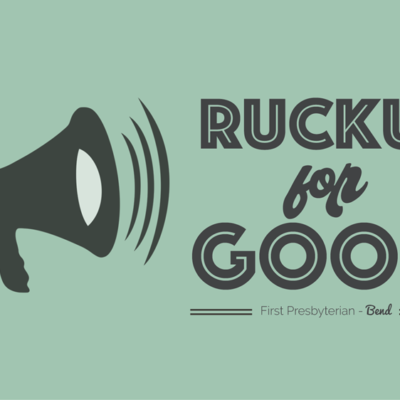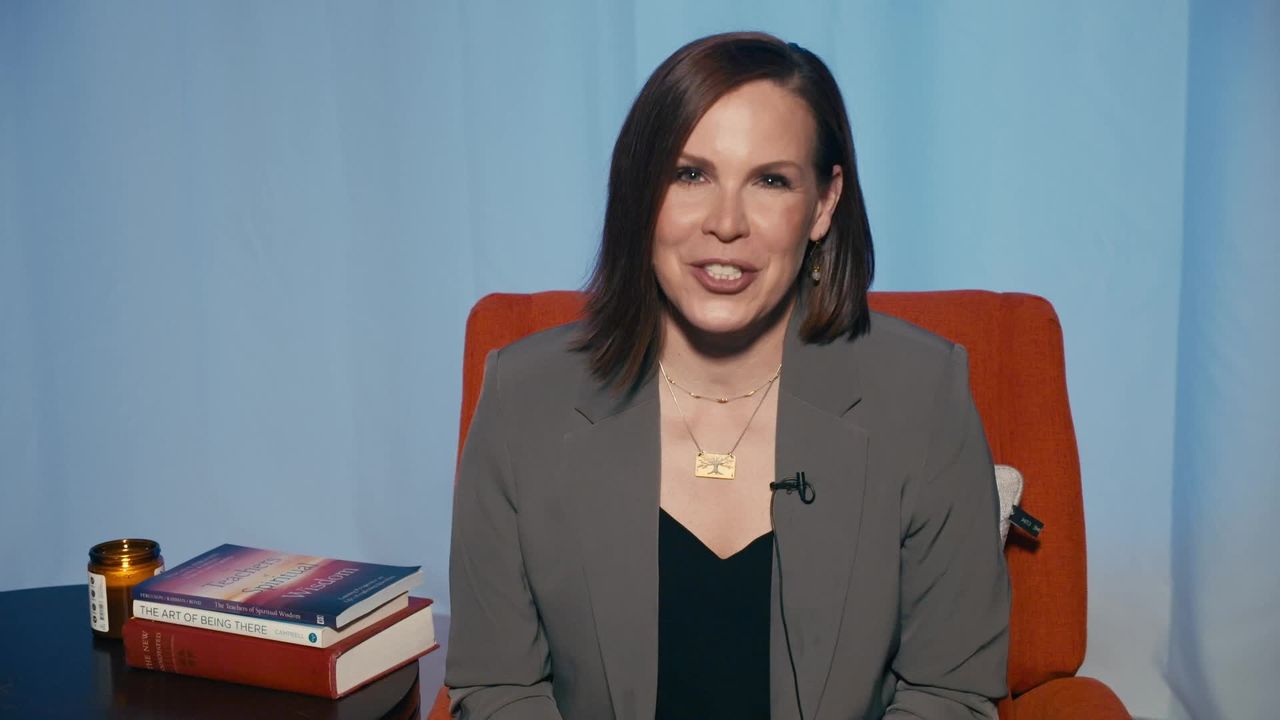May 7th: Addressing the Mental Health Crisis, with Rev. Kally Elliott.
A Part of the Series:
Rev. Kally Elliott
Other Articles in:
Transcript:
I still have a picture from that awful day in December 2010, my oldest son was singing a solo in church, wearing a little white choir robe standing in the center aisle. I must have been to the side because I took the picture meaning to capture just this heartwarming and proud mama moment. Instead, what I caught in the background haunts me to this day. My husband was there, in body at least, head bent low, a shell of the boisterous full of life man that I had known since 18. He was trying so hard to put one foot in front of the other, to keep on keeping on to be there for his family for his first borns seen singing debut. But you can see in the picture, the Herculean effort it took for him to sit in that church pew. Like you could poke him with one finger and he’d crumble into a million pieces. I met my husband when I was 18, a freshman in college at UC Davis, my husband was 21 in his fourth year of university, we fell in love while eating soft serve ice cream in the dining hall. He was a loud leader in our campus ministry, an offensive lineman for the UC Davis Aggies. He listened to my never ending stories, he made me laugh, we’d marry have three kids, maybe four we’d we travel to the family lake house for vacations, and we’d love each other well. That’s what we wanted. So, of course, that’s what would happen. And life was what we wanted, what we had planned. That is until a few months before I took that picture. He’d been different off. I couldn’t exactly put my finger on it. And then I took that picture. And in the background, the shell of the man that had once made me laugh so hard my sides ached. Of course, there is more to the story leading up to this moment and much more after. But this picture to this day feels like a punch in the gut every time I see it. May is Mental Health Month. And so here I am once again giving a sermon about mental health. But challenges with mental health weave in and out of every situation of life 365 Days and nights a year. We all experience mental health challenges from time to time. But the conversation I want to have today is about serious mental illness, the kind of mental illness that can greatly impair day to day functioning. There are many diagnoses of serious mental illness. Some of them include schizophrenia, bipolar disorder, depression with psychotic symptoms or treatment resistant depression, eating disorders, personality disorders, and anxiety disorders. The list is many. But the key is that they impair day to day living. At least 5% of the adult population lives with serious mental illness. Now, that may not seem like a significant number 5% But it is one in 20 adults. And if you think about the number of people with whom you interact on a daily or weekly basis, the number takes on a new meaning. And I say at least 5% of the adult population lives with serious mental illness because often as semis are misdiagnosed or under diagnosed or not diagnosed at all. Amy Simpson, author of troubled minds, writes mental illness is mainstream. But when my husband got sick, I didn’t think I knew anyone with mental illness. And I felt alone. I called a psychiatrist and after spending maybe 10 minutes with my husband, the doctor prescribed a specific medication. I started to argue, but Doctor, I’ve done my Google research and I know that this kind of medication can lead to further depression and even suicide in those with a family history of the pression his grandmother lived with severe depression. I’m, I’m not sure that this is the right medication for my husband. Isn’t there another medication option? It’ll be fine. The psychiatrist responded. Now, to be fair, I’m sure every doctor everywhere rolls her eyes when a patient begins a sentence with, but I’ve done my Google research. But it was not fine. Not fine at all. The Depression deepened until one day my husband could no longer carry it. He left. He did not die by suicide, thank God, but he did leave. And we had no idea where he had gone. It was the scariest time of my life. I don’t say this to fault the psychiatrist. Most psychiatrists are doing the best they can to care for their patients. I say this because I wonder how our experience might have been different. If this psychiatrists had slowed down, listened to my husband, and to me, dug a little deeper into our story. Seen my husband as a full human being with a history, family hopes, experiences and a desire to live fully instead of classifying him as a set of symptoms. In the 1960s, a Japanese theologian Kazuki Koyama wrote a book three mile an hour God, he noticed that the average speed that human beings walk at is three miles per hour. Jesus who is God walked it three miles per hour. God who is love walks at three miles per hour. Love has a speed Koyama says. And that speed is slow. That speed is gentle. That speed is tender. Anyone who has lived with mental health challenges, or who loves someone who does knows they are more than their biological symptoms, cured only through medical intervention, though medical intervention is a very central piece of the puzzle. The goal of mental health care then is not simply the eradication of symptoms, but care for the whole person.
I’ll be forever grateful for our church friends, who innately knew and practiced this parking themselves at our house for three straight days, sleeping over ferrying our young children to and from preschool, changing diapers, feeding us holding apps. You know, sometimes I struggle with prayer, like, is anybody really listening? And yet, I’ll never forget the weight of so many arms around me. And the fervent whispers of my friends praying over me and our family.
And when he returned, the care these friends had for my husband. Now, I apologize if this is sexist in any way. But I was particularly touched by the way the men from our church cared for their friend. These southern men most born and raised in Tennessee, where there is a certain way of being a man were weeping tears of joy for his return then, and tears of deep grief for the way their friends illness touched their own wounds, the ones that they’d held privately for so long. Because we all have deep wounds. And when someone we care about finally exposes theirs, it feels a little safer to share our own. None of us are more broken than the other. We are all in need of healing. Walking beside us on this journey. Our church showed us what friendship looks like. And the Gospel of John, Jesus tells His disciples,
this is my commandment, that you love one another as I have loved you. No one has greater love than this. To lay down one’s life for one’s friends. You are my friends.
But friendship doesn’t happen overnight. You know A study found it takes 200 hours together to become good friends. real friendship takes time. Because love has a speed. And that speed is slow. That speed is gentle that speed is tender. I asked a friend who loves someone with serious mental illness what she thought the church should know. She wrote, the big word that keeps coming to me, is fear. Most people don’t understand mental illness and want to avoid it at all costs. There’s an element of discomfort of getting sucked in over our heads. Friends, though, drawn near, they walk slowly together, noticing even savoring the good and the other friends believe and the others goodness and they fight like hell for them when they see anything diminishing that light within friends help us hold on to God’s presence, even in the midst of mental health challenges and difficult experiences. And what have we, the Church lived as friends to those living with mental health challenges and their families? How might our lives be enhanced by walking with them? In many of the gospel stories, Jesus heals those who are sick or lame or blind. Some of the stories make it sound like this healing was instantaneously a quick fix and maybe somewhere. But the word used for healing is the same word Jesus uses when a woman falls at His feet with gratitude because she has been forgiven. The same word describes a man after his leprosy has disappeared and Zacchaeus after he has given away half of his possessions. The root word in all of these cases of healing is so XO It’s a Greek word meaning wholeness, wholeness and spirit. wholeness in mind, wholeness in body, it is complete healing for body, soul, and spirit. For Jesus, healing happens when the body, soul and spirit are made whole. But this cannot happen without friendship. There’s a story in the gospels that people often point to as a story of someone suffering from mental illness. The story opens with Jesus crossing the sea of Galilee. And as soon as he steps off his boat, a man who the text said lived naked and raving mad among the tombs, alienated from the townspeople, throws himself at Jesus’s feet, yelling at him. Jesus asks the man his name, but does not get an answer. Because what the text says is that the demons answer instead, I want to be clear that I do not think it helpful to equate mental illness with demon possession. However, in biblical times, they did not have the medical knowledge we have about the brain. So when biblical authors refer to demons, they may have been referring to mental illness. But back to the story, Jesus asks the man his name and the demons answer instead. So Jesus casts out the demons and the man regains his right mind.
But the man isn’t healed because he reaches out to Jesus. The healing begins as Jesus gets in his boat, and crosses the sea, approaching the tombs. The healing begins as Jesus asks the man his name.
The healing begins as Jesus approaches the man in friendship. But the full healing happens at the end of the story. The man begs to go with Jesus. But Jesus says no, and instead sends him away saying, return to your home, and declare what God has done for you. And as the man returned home, he is restored to his community. The healing the full healing happens as he is restored to his friends. And it makes me wonder, was the problem really in the demon possession are the misfiring neurons of his brain? Or was the problem in the community that rejected and abandoned And this man in the first place at one point, and one of his deepest days of depression, I needed help. I was beginning to feel hopeless. If you’ve ever been loved by someone who lives with mental health challenges, you know that sometimes just stayin alive, takes everything they have, and there isn’t much left over for you. It can feel terribly lonely.
But I also needed practical help. I needed to put together a fire pit and quickly, having moved to a new city, I was leading a fledgling church, and we were to be gathering around a bonfire in a couple of hours, and I still had errands to run, knowing it would take every ounce of his energy and more. In my stress and frustration, I asked my husband if he could just put it together for me. And I left to run the necessary errands thinking I’d figure it out. I’d figured out the firepit when I returned,
when I pulled up an hour or so later, there was the firepit fully constructed, wood piled beside it lighter on top. It may seem like a little thing. It’s a fire pit. But dang it in that moment. It was so very much he was in there. The man I loved the man who loved his family, the man who loved me. I met and fell in love with my husband when I was 18 had no idea what was ahead of us. And he lives a full life he loves well, but that illness will always be part of him, and thus part of me.
But we couldn’t have made it this far without the love and the support and the willingness to draw near from our church in Tennessee, and from so many others along the way. In the crisis, and long after they were they’re walking alongside us in friendship.
Love has a speed and that speed is slow. That speed is gentle. That speed is tender. And it is the healing we all so desperately need. Amen.



